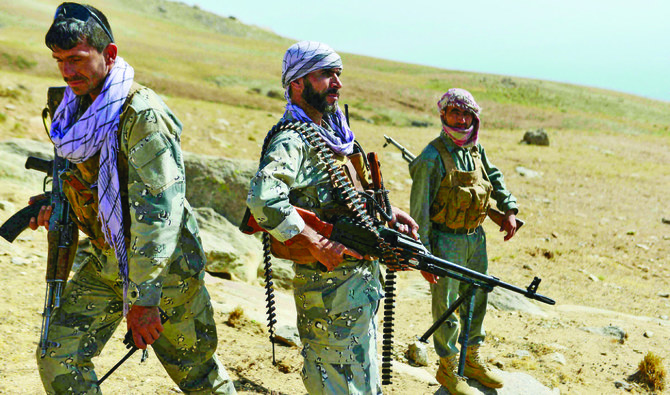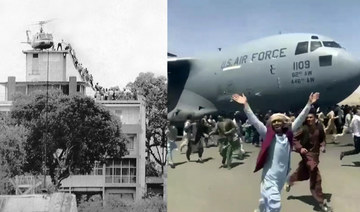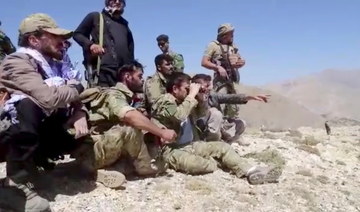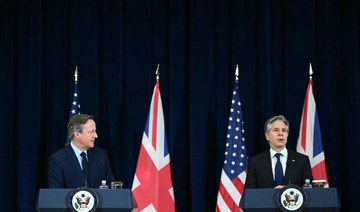KABUL: The Taliban said on Monday they have taken control of Panjshir province north of Kabul, the last holdout of anti-Taliban forces in the country and the only province the Taliban had not seized during their blitz across Afghanistan last month.
Thousands of Taliban fighters overran eight districts of Panjshir overnight, according to witnesses from the area who spoke on condition of anonymity, fearing for their safety. Taliban spokesman Zabihullah Mujahid issued a statement, saying Panjshir was now under the control of Taliban fighters.
“We tried our best to solve the problem through negotiations, and they rejected talks and then we had to send our forces to fight,” Mujahid later told a press conference in Kabul.
Pictures on social media showed Taliban members standing in front of the gate of the Panjshir provincial governor’s compound.
#WATCH: #Taliban fighters broke out into prayers as their banner fluttered from a flagpole in #Panjshir on Monday, after the group captured the last pocket of resistance to their rule. https://t.co/xSna6amGM7 pic.twitter.com/2vc5NGkxSF
— Arab News (@arabnews) September 7, 2021
Taliban forces said had entered deep into Panjshir Valley on Sunday amid calls for a ceasefire from Afghan religious scholars.
Intense fighting between the Taliban and the National Resistance Front of Afghanistan in Panjshir began last week, as US forces officially completed their withdrawal and ended a two-decade presence on Afghan soil.
For the past few days, Taliban forces and the resistance front, which comprises thousands of fighters from regional militias and Afghanistan’s former security forces, have been claiming battle gains. On Friday night, Taliban sources told the media they had seized the mountainous northern region, but resistance leaders quickly denied the claim. New advances were announced by the Taliban on Sunday, after heavy fighting reported a day earlier. A Taliban commander in Panjshir said fighters had entered deeper into the valley and taken control of new districts.
“Now Anaba and Rokha districts are under our control, mujahideen are gaining ground and they are moving to Bazarak,” the commander, Mawlawi Ezatullah Badr told Arab News from Panjshir. “Yesterday, we took Shotol district and now we have stopped the war, the enemy have suffered massive casualties.”
At the same time, the resistance front said the Taliban who had entered the valley were trapped by their forces.
“The Taliban were ambushed in several fronts in Shotol, Khawak and also Dara-e-Tang. During this operation, the Taliban suffered massive casualties and at least 1,600 Taliban fighters has surrendered to NRFA,” resistance commander Zemaray Ahmadyar said.
As the fighting continued, religious scholars who before the Taliban takeover were in the Kabul chapter of Afghanistan’s Ulema Council, called on both sides to return to negotiations.
“Ending the war is urgent, we need to speak with both sides,” the scholars said in a joint statement on Sunday. “This war is harmful to everyone, and it must be stopped immediately. We would continue to negotiate with both sides; first we would discuss this issue with the Taliban and then we would go to Panjshir.”
Earlier negotiations did not stop the fighting.
“We held negotiations, but they failed. The other side welcomed war rather than peace. Now the mujahideen are ordered to continue their offensive operations and we are close to the center of Panjshir,” said Enamullah Samangani, a member of the Taliban’s cultural commission.
Resistance front spokesperson Fahim Dashti said last week the Taliban had offered them a 50 percent share of power in Afghanistan, but the offer was declined.
Panjshir has a history of resistance. In the 1980s, its famed commander Ahmad Shah Massoud defended the region from Soviet forces, and in the 1990s led an offensive against the first Taliban regime. He was assassinated in 2001, weeks before the Taliban were ousted by a US-led invasion.
The resistance is led by Massoud’s son, Ahmad Massoud, and Amrullah Saleh, who until the Taliban takeover of Kabul and the collapse of the Afghan government over two weeks ago served as first vice president.
While seizing Panjshir would give the Taliban complete control of Afghanistan — something they did not achieve when they ruled the country between 1996 and 2001 — a top US general warned on Saturday that continued fighting may lead to a wider civil war and resurrection of various militant groups in Afghanistan.
“I think there’s at least a very good probability of a broader civil war,” Gen. Mark Milley, chairman of the US Joint Chiefs of Staff, said in an interview with Fox News.
“That will then in turn lead to conditions that could lead to a reconstitution of Al-Qaeda or a growth of ISIS (Daesh).”
Afghanistan has been without a government since President Ashraf Ghani fled the country as the Taliban entered Kabul on Aug. 15.
The power vacuum has thrown Afghanistan’s economy into disarray, as most payments to the country, which for the past two decades has depended on foreign aid, have been suspended.
Plans to unveil a new government were postponed as the Taliban waited for Panjshir to fall, sources say.

























